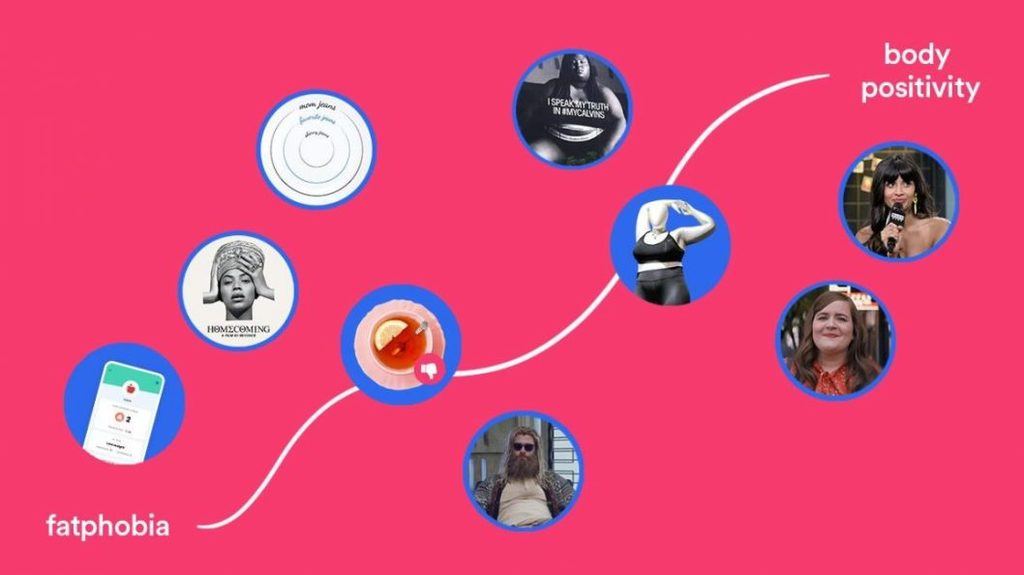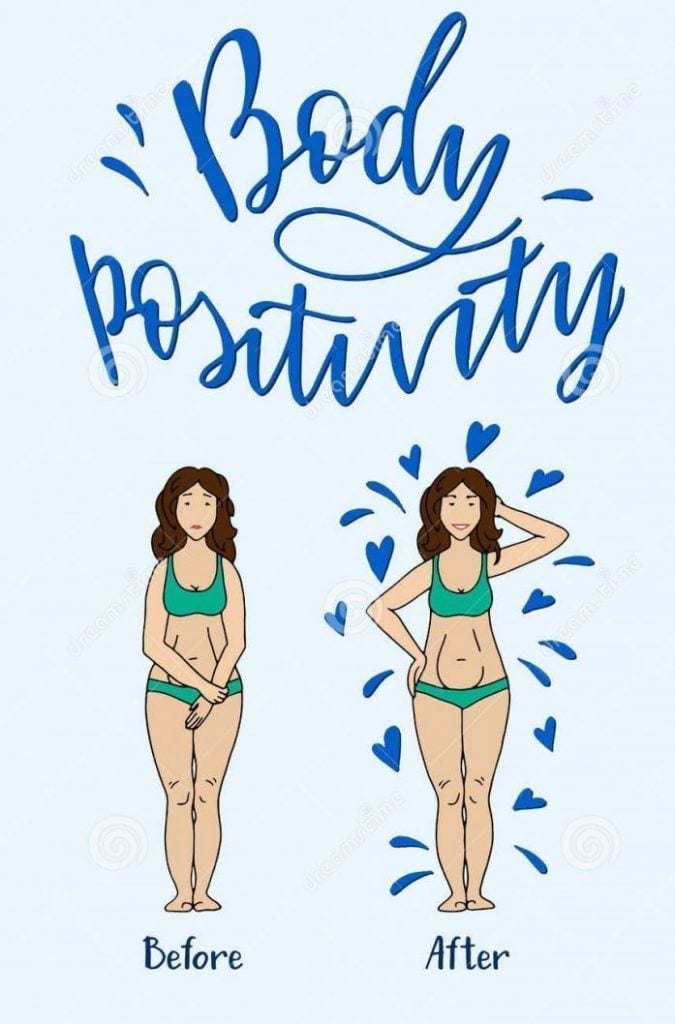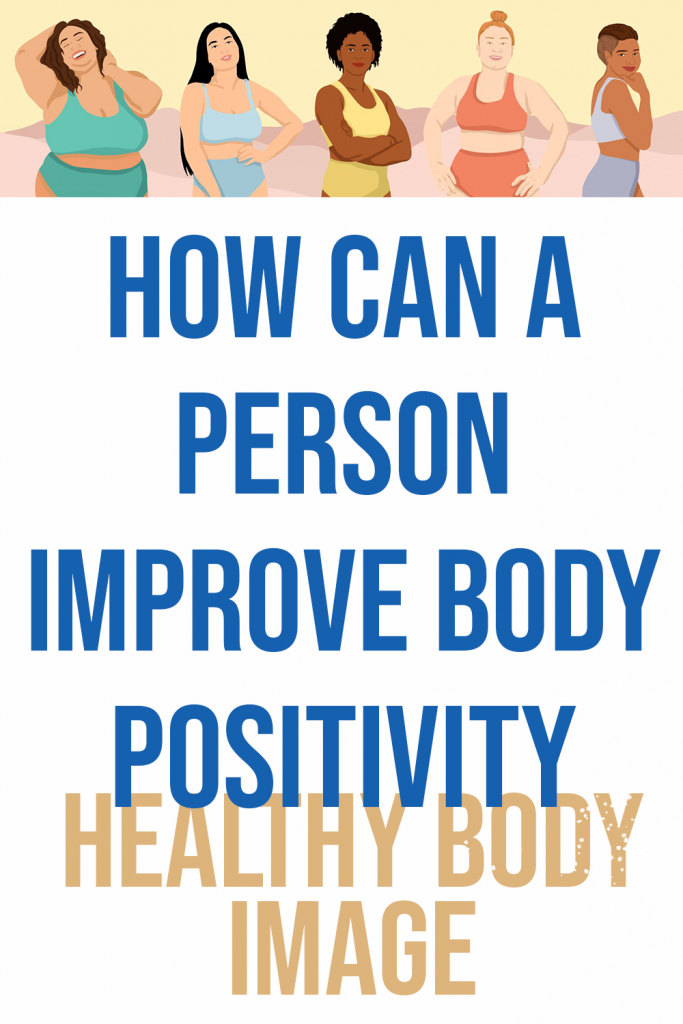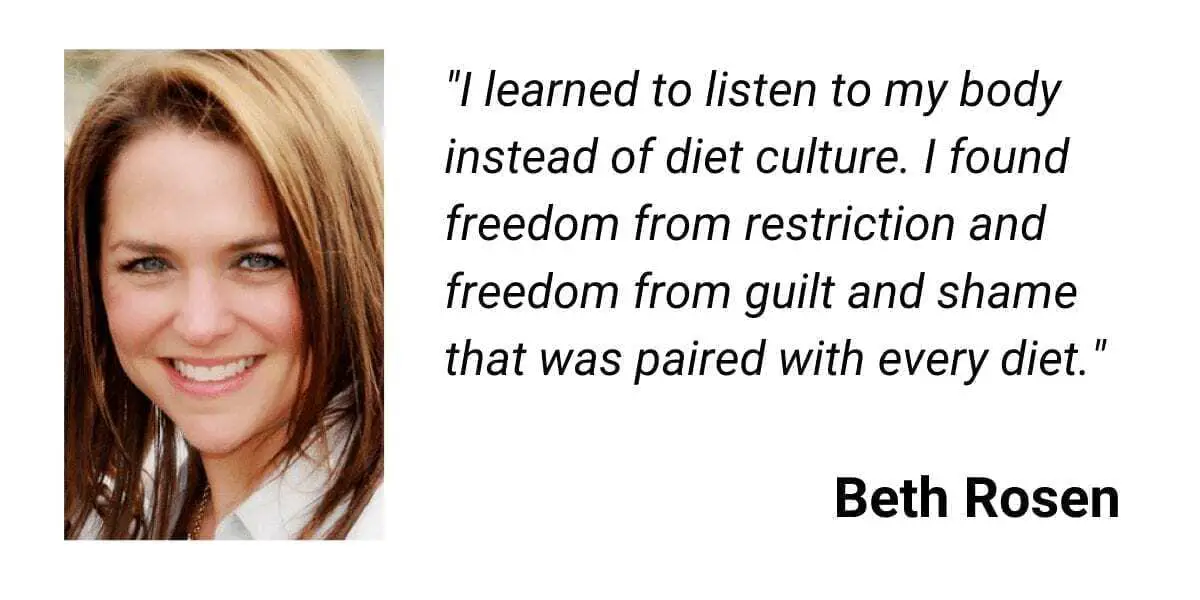You just had a crazy binge and ‘failed’ another diet, pretend. Pretend you feel horrible (just for a moment).
Pretend you’re feeling horrible but instead of eating more or wallowing in self pity…
This time around you take out a pen and paper and ask yourself why:
- Why did I lose motivation?
- Why do I not take care of myself?
And using this technique you realize your body image is the root of all your problems.
- Why take care of a body that you don’t even like?
- Why exercise if you hate your body?
And now stop feeling horrible. Scene over.
Now say you realize that body image is the problem …
How can you improve your body image?
And if you can improve your body image, how can you then maintain this body positivity?
Because if you can relate to your body differently …
Perhaps all the other related problems (lack of motivation, etc) will begin to take care of themselves …
Welcome to this episode of Eating Enlightenment about body positivity and how can a person maintain a positive body image with Beth Rosen.
In this post Beth Rosen gives us tools to:
- improve body positivity
- help maintain a healthy body image
Now often times ‘body positivity’ is misunderstood.
Many people think body positivity means you are giving yourself permission to be unhealthy and fat.
Nothing could be farther from the truth. In fact, this is the opposite of body positivity!
So in this post we explore how to improve and maintain body positivity by examining two distinct trains of thought:
- What is the opposite of body positivity?
- How can I improve my body positivity?
(Body acceptance is also a radical act of self love, read more here by Tanya Mark)
When we learn about the opposite of body positivity … we’ll see:
- how a culture of impossible beauty standards sets us up for body dissatisfaction
- why body dissatisfaction leads to negative mental health out comes and eating disorders
- examples of how your mental health and anxiety are effected daily by diet culture
Now Beth is an amazing presenter of information. These are some big complex ideas we’re talking about here.
But just trust me … listen to Beth she explains everything and just makes everything make sense.
(More on Beth below too because she’s awesome!)
After you get a grasp of diet culture and impossible standards …
You’ll be ready to really understand how to improve your body positivity:
- how to start being body positive by choosing a new set of standards
- overcome your weight stigma fears
- how to maintain a healthy body image once you embrace being body positive
(It took Beth 15 years to embrace intuitive eating after she first heard of the concept. You can listen to that section of her story in the interview down below! Perhaps by hearing her story you won’t wait so long!)
About Beth and Her Health At Every Size Journey and Career
Beth is a non diet registered dietitian and the owner of Good Gracious Living Nutrition.
Beth has a bachelor’s degree in dietetics from the university of Maryland, a master’s degree in nutrition education from Columbia university and has been working in the field for over 20 years in Southbury, Connecticut.
She has a private practice and she focuses not only on food but also food related things such as digestive disorders, like irritable bowel disease, small intestinal bacterial overgrowth.
Beth has been featured on:
- Huffington post
- Fabulous magazine
- Fox 61 morning show as a regular contributor.
Beth also has a variety of free resources on her website one of which I am linking to down below:
“The Inner Girl Power Challenge“
Finally, please feel free to reach out to Beth!
https://goodnessgraciousliving.com/
Ok let’s dive in by examining the misconception marketers falsely promote that body positivity means it’s ok to be fat and lazy.
What is the opposite of body positivity?
in this section we’ll focus on giving you the big picture mainstream diet culture.
This diet culture is the opposite of body positivity.
Diet culture is filled with judgement.
Being fat is a choice. Having thighs, belly, hips … these are all too large for the best body shape!
And there is a best body shape! It’s ridiculously thin with big butt and boobs. Not too big though god forbid.
Do you see how these voices of negativity directly cause depression?
There’s no room for individuals with flaws to be content with themselves and their clothes in this world.
As a result self-love, self-esteem and self-care all get thrown out the window!
First, let’s look at the historical culture of impossible appearance standards and how our culture sets us up for body dissatisfaction and insecurities.
Beth does a wonderful job starting at 13:35 in the conversation talking about how American culture has changed it’s body image standard.
Beth’s main points are:
- in the 1960’s the body image was much different than today
- Less than 10% of female popular are represented in mainstream media body images
- Our culture is obsessed with dieting from Oprah to Nutrisystem
“And then if you think ahead to the 1960s, that’s when models began to change what they looked like…
That’s when Twiggy came on, right?
So very small women came to represent all women. And as the decades have gone on, what you can see is that the “body ideal” has changed a little bit in the public eye.
We went from Twiggy to Kim Kardashian and in both scenarios they are less than 10% of the female population in the US.
The majority of women are size 16 or above. And yet we don’t see that represented in mainstream media.
(So companies know girls will form their opinion based on the brands and messages they see most frequently. That’s why there are billions of dollars spent towards marketing efforts to make a woman feel like her existence is based purely on image.
And then those companies sell products. Aka, gyms during New Years Resolutions…)
What we do here, especially most recently during January 2020 …
If you watched any TV, every other commercial solution for fatness sponsored by a diet company.
You have Oprah screaming bread at you. You’ve got Jenny Craig saying it’s not a diet. (PS, it’s a diet.)
You’ve got Maria Osmund’s screaming about her Nutrisystem.
They’re all diets, right?
They’re all showing these unattainable ways to get smaller and then not be able to stay smaller and then they blame you for not being able to do it.
The same brand names then sponsor with clothing companies to sell clothes of various color, kind, and types for even more money!

How to start being body positive by choosing a new set of standards
Skepticism is one of the main reasons I love Buddhism.
Now in terms of the body positivity movement …
You really have to think for yourself what being fat means.
Why do you have to be skeptical and think for yourself?
It’s simple. Mainstream culture is not body positive.
Mainstream culture:
- discriminates against bigger bodies
- bigger body sizes are pathologized and seen as evil
- weight stigma creates more stress
- stress get internalized
- people avoid seeking treatment or help because they feel ashamed
Listen to Beth at 22:23 talk about the current standards of body acceptance.
Do you want these cultural standards to be your standards?
“People who live in fat bodies experienced stigma all the time and they experience fatphobia all the time. There’s a lot of stereotypes around fat people being lazy.
People who live in larger bodies are not necessarily there because they overate. Bodies come in all shapes and sizes.
And what calling somebody obese pathologizes a body size. It says at this size you are not well and that’s not the case.
You can be well in a small body, or well in a big body. You can be sick in a small body and sick in a big body vice versa,
But the weight stigma attacks the people who are in larger bodies and the stress that people experience from weight stigma stops them from seeing doctors.
For me personally I feared going to a doctor’s office and going in with a cold and being told to go on a diet.
These are the things that my clients experience every day. And there was a fear of that.”
The Fat Acceptance Movement Arises From Our Body Negative Culture
So before we dive into exploring ways about being body positive …
Let’s be clear –
Being body positive does not mean that you are lazy and just resign yourself into being fat and unhealthy for the rest of your life.
That’s a mischaracterization of the entire body positive moment.
Instead, you can see that our current mainstream standards are horrible for people:
- there is size discrimination
- size discrimination harms people
- believing that ‘being fat’ is morally wrong actually backfires as people force themselves to diet
- dieting never works. You actually end up yo yo dieting which is horrible for your health
- people get caught in a never ending loop of dieting, binge eating and discrimination
- this horrible cycle ruins lives and kills people
So being body positive is doing that opposite.
It’s realizing that you can’t tell a person’s character by their weight.
Now me personally …
I like the word body neutrality the most.
But positivity is more catchy 🙂
And after all … your body and mine …
Someone got congealed out of stardust.
Trillions of cells are working together harmoniously.
Our hearts beat without any thought.
That’s something to celebrate!
Instead of having body expectations that we need to be a perfect model or shape…
Let’s celebrate the fact that we have brains and consciousness awareness.
That’s something to be positive about 🙂
How can I improve my body positivity?
Ok … let’s talk about the new way.
How can I improve my body positivity?
First we explored the misconceptions of weight loss, and learned how the body positivity movement originates from our current diet culture
(The gist is that our current attitude towards people hurts people and discriminates against larger sizes)
Let’s begin to improve body positivity by learning …

How to start being body positive by choosing a new set of standards
At the end of the interview I told Beth that this analogy really stuck with me…
The analogy was simple, but powerful.
I’ll let Beth take it away beginning at 17:29 …
“If you get a gift you don’t like for your birthday or holidays … if you don’t like the gift …
It’s not something you’re going to pay attention to or take care of. But if somebody gives you a gift that you really like and treasure and enjoy, you’re going to really take care of it.
And that analogy sort of goes along with how we think about our bodies. If we don’t like our bodies, we’re less likely to care for them, right?
So a lot of times people think when we go off of dieting that we are letting ourselves go.
But what we’re doing is once you let go of the dieting and you’re able to make peace with your body and make peace with food, you’re more likely to take care of your body because you respect it.”
Quick note – food freedom = body respect
So you decide to quit dieting and respect your body …
This realization leads to a powerful eating enlightenment mindset …
That you have to honor your body’s:
- need for hunger
- fullness sensations
- food preferences
- what makes your body happy
- and dropping all the diet rules!
But … dropping all the rules will trigger a subconscious fear for you most likely … just a heads up!
This is the fear of weight stigma.
This is the fear you’ll get fat.
How to get over your weight stigma fears
” (Jared) Can you share any wisdom or stories around this fear of unrestricting food?
(Beth) Yeah, I would say a lot of times with my clients when I tell them we’re not going to diet they reply they need a set of rules.
They say things like “I need rules because I feel like I’m going to fall off a cliff without a support wire or something.”
And that’s what it feels like when you haven’t listened to your body your whole life.
And then all of a sudden somebody says, “well, if you listen to it, you’ll be in a safer place.”
But the thing is …that’s difficult to do. Especially if you have been in a place where you haven’t listened or honored or respected your body for years.
But I remind them that when you’re a baby and you’re hungry, you cry and somebody answers and feeds you.
And if you think about toddlers, …when they’re done eating, even if you try to put one more airplane spoonful in their mouth, they will spit it at you. They will throw food they have away because they don’t want anything to do with it.
That’s their intuition. They’re taking care of their body, knowing when they’ve gotten to fullness and they’re honoring fullness, right?
So you do have the tools. They’ve just been tamped down from all the years of dieting.”
Wow. Holy shit pardon my language.
This is the answer to “how do you improve your body positivity?”!
You have to realize you can trust your body even though it might be scary to do so.
When you can trust your body then you can respect it from a sincere place and take care of it.

How to maintain a healthy body image once you embrace being body positive
So this answer is nuanced.
Maintenance means learning to enjoy the journey in an authentic way.
Let’s break this down.
- authentic way means you listen to your body preferences to discover what foods, amounts and times work for you
- journey means you don’t figure out everything all at once but learn from experience
- enjoy 🙂
Here’s an analogy that also works:
Why do children walk?
Why not crawl all the time for the rest of their life?
Children learn a new skill (walking) because they like walking and walking makes them feel good and benefits them in other ways.
But walking takes effort!
Walking requires falling down.
But if the rewards are worth it …
And genuinely, authentically worth it …
Where you are listening to your body and connecting the dots …
Then the rewards will be worth it for YOU.
This makes you love the journey more. You continue to progress your skills.
The baby learns to hike, to run, to climb, and even to skip along to a rhythm.
This is exactly how can a person can maintain a healthy body image.
Just listen to Beth at 24:39
“It came in phases. So at first the unrestriction was to start to include foods that I had limited for years.
I had restricted certain foods because they were either on the “bad list” or because I felt terrible emotionally when I ate them. What I didn’t do was explore how these foods made me feel physically.
So I started to slowly add those foods in. But I did find that when I was starting intuitive eating, I made the rookie mistake and that rookie mistake was making it a hunger fullness diet.
(notice how Beth admits to making a mistake without any guilt and says how she learned from her mistake. Do you see how this is like learning how to walk? When you successfully learn how to walk, you maintain the habit in part because you struggled to learn it!)
So I only when I was hungry and I stopped when I was full. And that limits the amount of time you can have where you can enjoy food.
There’s more than just eating for fuel. There’s also eating for connection, right?
So if it’s someone’s birthday or you’re going out for drinks those can times when you eat too.
So that was the first piece was really getting to the point where I could understand that I didn’t always have to stop when I was satisfied or I didn’t always have to wait until I was hungry.
I found that I was like waiting to get hungry and sometimes you just want to find something, you just want a little something. So that was the first part.
And then I started to expand my food repertoire because it really had been very limited over the number of years that I dieted. That was fun, but also a little scary.
And I do that with clients too. I call it fearless eating and we practice eating foods and having them around so that we remove food scarcity.
Food scarcity is literally a lack of food or limiting it so much that you don’t have it.
(do you see now how Beth is adding in foods that her body wants? She’s allowing herself to explore and go on a journey. By exploration, she becomes more likely to find something authentic and sustainable for her and therefore she can maintain her increasingly healthy body image.)
That’s all for this post!
For another post of mine about body positive thoughts … just read this post here “How To Deal With Overeating Without Guilt or Shame With Beth Reel – Bay Area Binge Eating Podcast“.




